10 exerciții cu timpurile verbale în engleză. Rezolvare și explicații pentru fiecare

Exersează-ți mușchiul gramatical la engleză și vezi cât de ager ai devenit în urma cursurilor sau cât de ager mai ești, dacă a trecut ceva timp de când nu ai mai studiat această limbă… Testează cât de bine mai cunoști – și recunoști – timpurile verbale prin rezolvarea acestor 10 exerciții care devin progresiv mai grele și mai provocatoare. (Dacă simți nevoia de o încălzire înainte de a încorda mușchiul gramatical, citește articolul nostru anterior despre timpurile verbale prezentate pe scurt și pe înțeles, cu multe exemple).
- Exerciții cu timpurile verbale în engleză pentru începători și nivel mediu
- I. Identifică timpul verbal și rescrie următoarele propoziții afirmative la forma negativă, apoi interogativă:
- II. Completează spațiile albe cu verbul din paranteză la timpul potrivit:
- III. Alege răspunsul corect:
- IV. Finalizează întrebările după model:
- V. Ordonează cuvintele pentru a obține propoziții corecte în limba engleză:
- Exerciții dificile pentru avansați
- VI. Reformulează propozițiile următoare conform cerințelor:
- VII. Completează spațiile albe cu verbe la alegerea ta, folosind timpul verbal care se potrivește cel mai bine contextului.
- VIII. Transformă următoarele propoziții, fără a le schimba înțelesul, la diateza pasivă:
- IX. Potrivește jumătățile de frază astfel încât acestea să fie corecte.
- X. Corectează greșelile gramaticale din enunțurile următoare:
- Ce exerciții cu timpurile verbale se dau la examenele Cambridge
- De ce timpurile verbale din engleză sunt dificile pentru români
Exerciții cu timpurile verbale în engleză pentru începători și nivel mediu
Vom începe cu ceva simplu, menit să te familiarizeze cu denumirile și formele verbelor. Pe măsură ce rezolvi primele exerciții, nivelul de dificultate crește către nivelul A2 – B1. Găsești răspunsurile pentru toate cele 10 exerciții cu timpurile verbale în engleză în acest document pentru a te verifica.
I. Identifică timpul verbal și rescrie următoarele propoziții afirmative la forma negativă, apoi interogativă:
I swim at the pool every day.
My friend goes to work at half past ten every morning.
You are afraid of dogs.
He is lazy this morning.
We are running to catch the bus right now.
We went to the cinema at the weekend.
I was sleeping when he left.
She has already started smoking at 15!
You had already sent the email when you heard the news.
My boss has been waiting for this email for two weeks now.
My sister is going to get married soon.
I will help him carry the heavy bags!
My kids will have finished their homework by the time I get home.
This bridge was built by the former mayor.

Pentru a rezolva acest exercițiu, este necesar să identifici timpurile, dar și auxiliarul care trebuie folosit la fiecare în parte, pentru formele negativă și interogativă. De reținut că atunci când avem întrebări în limba engleză, începem cu auxiliarul sau cu verbul direct (în cazul verbelor to be și a verbelor modale), niciodată cu persoana: Do you like? Has he eaten? etc
II. Completează spațiile albe cu verbul din paranteză la timpul potrivit:
My friend and I ________________ (to go) to the pub last night.
My roommate ________________ (to go) to the gym every morning.
Where ______________________ (you / to go) now? I _________________ (to go) to the market to get some fresh vegetables.
I __________never ________ (to try) shark meat. I heard it’s delicious!
I can see the stars so clearly! The sky ______________________ (to be) clear tomorrow.
I ____________ never___________ (to meet) a Chinese person before i met him.
My husband ________________________ (to peel) potatoes last night at 11 o’clock!
Today I ___________________ (to do) the laundry. So I am busy!
How often _________ you __________ (to have) your hair cut? Once a month.
We usually _____________ (to work) with other companies, but right now we _________________________ (to work) with a physical person on this project.
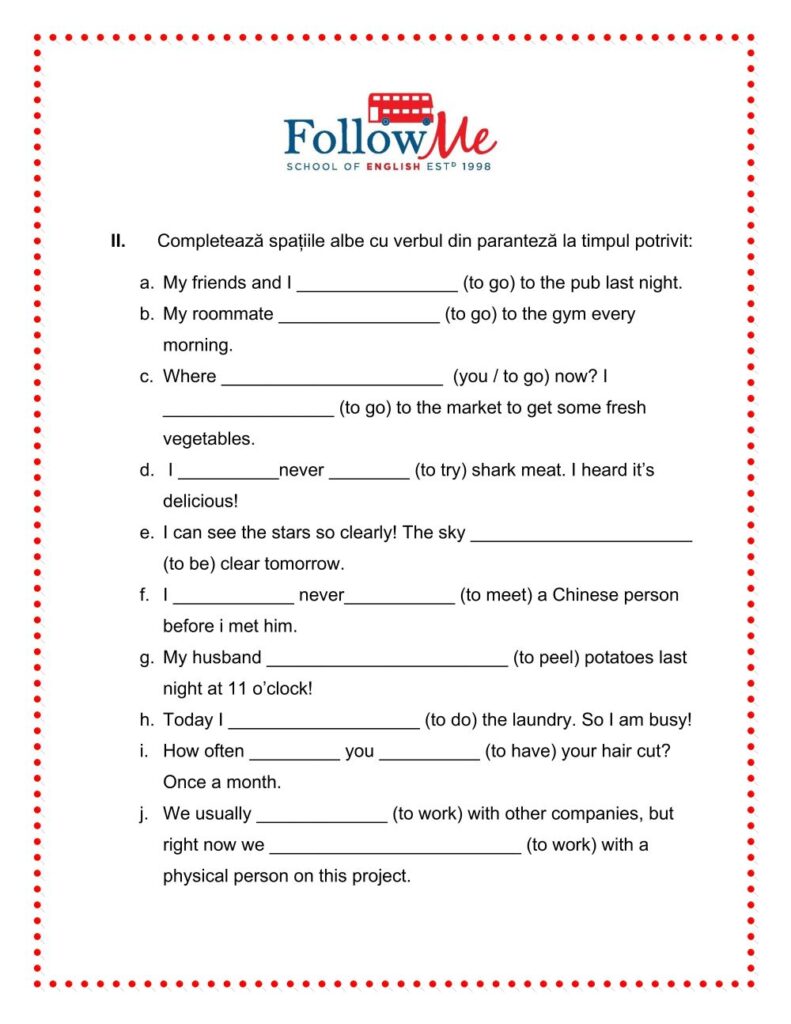
Exercițiul se rezolvă acordând mare atenție adverbelor de timp / cuvintelor marker care indică folosirea unui anumit timp verbal. Astfel:
Adverbele de frecvență (always, often, usually, sometimes, rarely, hardly ever, seldom, never) cer de obicei prezentul simplu (dacă e vorba de o acțiune plasată în prezent), pe când now, right now, today, this week / month, currently, at present cer folosirea Prezentului continuu.
Termenii care indică foarte clar un moment din trecut (yesterday, last night, last week / year, when i was little, two years ago) cer Trecutul simplu dacă vorbim de o acțiune încheiată, pe când adverbele ever, never, already, yet, just, for, since cer prezentul perfect, ele indicând o acțiune din trecut o legătură cu prezentul.
O acțiune care e situată în timp și finalizată înaintea unei alte acțiuni din trecut va fi exprimată prin Mai mult ca perfect (Past Perfect), iar o acțiune aflată în curs de dsfășurare la un anumit punct în trecut (de exemplu, ieri la ora 3), neîncheiată deci, va fi exprimată prin Past Continuous.
III. Alege răspunsul corect:
- My parents _________________ to Greece every summer. a) Are travelling b) travel c) travelled d) are going to travel
- Your brother is in the garage right now, he ________________ his car. a) Fixes b) fixed c) is fixing d) will have fixed
- I usually _____________ in my own apartment, but this week I _________________ in my parents’, because I let my visiting sister and her family use mine. a) Stay, am staying b) am staying, stay c) stayed, have stayed d) have been staying, stay
- We _______________ the building around 10 pm last night. a) Were leaving b) left c) leaved d) have left
- My son ____________________ the doorbell while he was having a shower. a) Heared b) was hearing c) heard d) hears
- My daughter ______________________ her homework while my son _____________________ on the computer. a) Did, played b) has done, has played c) will do, will play d) was doing, was playing
- This famous writer _______________ in 1956. a) Has died b) died c) had died d) had been dying
- We ______________________ lot of types of students at this language school. a) Saw b) had seen c) have seen d) were seeing
- This year I ___________________ in three marathons. a) Run b) ran c) have run d) will have run
- Actually, I ____________________ this film before we went to the cinema together. a) Had seen b) saw c) have seen d)had been seeing
- I had never tasted sushi before you ______________ me some. a) Bring b) brought c) had brought d) bringed

IV. Finalizează întrebările după model:
You are tired, aren’t you?
He speaks Arabic, doesn’t he?
She is looking forward to seeing you, _________________?
He forgot his umbrella, _____________________?
We are leaving tomorrow at 7, _______________________?
This doctor can help you, ____________________?
They are afraid of spiders, _________________?
She was joking when she said that, ____________________?
She has just finished her exams, ___________________?
Your friends got married last week, ________________?
He deserves the best in life, __________________?
You had tried to open this door even before I told you to, _________________?
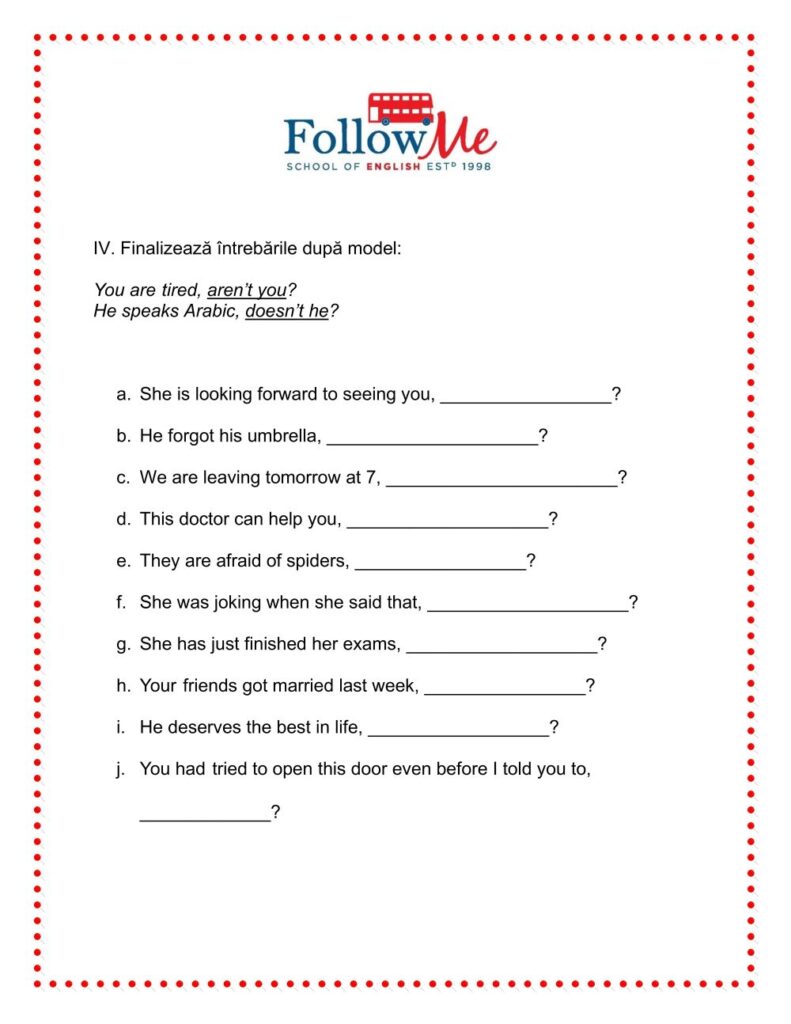
Pentru acest exercițiu, e necesar să identifici timpul verbal folosit deja în întrebare și să folosești auxiliarul acelui timp, la forma potrivită (acolo unde e cazul de mai multe forme – de exemplu la prezentul simplu, unde poți alege între DO sau DOES, sau la prezentul continuu, unde ai variantele AM / ARE / IS).
V. Ordonează cuvintele pentru a obține propoziții corecte în limba engleză:
- often/ we / the / talk / to / friends / our/ Spain / in
- never / believe / she / how / could / is / make / to / it / easy / pancakes.
- Never / told / I / not / have / smoke / been / this / in / house / to.
- Before / brush / do / usually / you / teeth / breakfast / your?
- Haven’t / yet / how / entirely / I / realized / amazing / are / you.
- He / me / asked / liked / what / was / that / it / you / wife / about / your.
- Need / you / pay / don’t / for / to / tickets / free / the / they / as / are.
- Stumble / you / did / dizzy / or / you / were / morning / this / fell / you / when?
- Doctor / go / going / I / to / am / the / earache / if / my / until / stop / tomorrow / doesn’t.
- Eye / her / taken / have / look / you / at / a / yet?

Exerciții dificile pentru avansați
Cursanții de nivel avansat au capacitatea de a se juca altfel cu timpurile verbale în limba engleză. Iar dacă nu o au încă în proporție de 100%, o pot exersa! Iată propunerile noastre:
VI. Reformulează propozițiile următoare conform cerințelor:
- Rewrite the sentence using the passive voice: The chef is preparing a delicious meal in the kitchen.
- Rephrase the sentence using present perfect simple: I started learning Spanish five years ago.
- Transform the sentence using emphatic inversion: Rarely has she seen such a breathtaking view.
- Use „had rather” to rephrase the sentence: I prefer not to go out tonight.
- Rewrite the sentence using present perfect continuous: They have been renovating the house for three months.
- Rephrase the sentence using a mixed conditional: If I had studied harder, I would have passed the exam.
- Transform the sentence using the passive voice: The company awarded him the Employee of the Year title.
- Use „had better” to rephrase the sentence: It’s advisable for you to submit the report by Friday.
- Rewrite the sentence using present perfect simple: He started working on this project last year.
- Rephrase the sentence using emphatic inversion: Never have I met such a friendly and welcoming group of people.
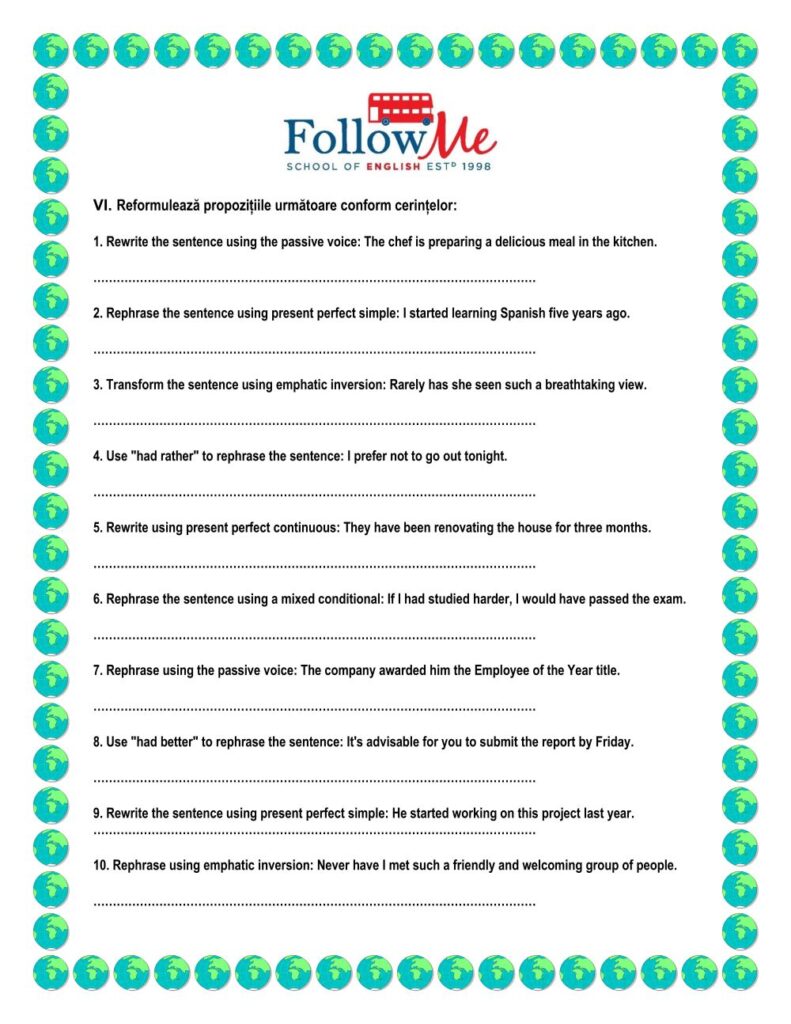
VII. Completează spațiile albe cu verbe la alegerea ta, folosind timpul verbal care se potrivește cel mai bine contextului.
Alege între Past Simple, Past Continuous, Present Perfect simple și continuous, past perfect simple si continuous.
In the small town where I (1) __________ (grow up), life (2) __________ (be) simple and everyone (3) __________ (know) each other. One day, as I (4) __________ (walk) to school, I (5) __________ (realize) that I (6) __________ (forget) my homework at home. Panicking, I (7) __________ (run) back home, but when I (8) __________ (arrive), I (9) __________ (realize) that I (10) __________ (leave) the keys inside.
My neighbor, Mrs. Johnson, (11) __________ (see) my distress and (12) __________ (offer) to help. While we (13) __________ (wait) for a locksmith, she (14) __________ (tell) me stories about her own childhood. She (15) __________ (grow up) in the same town and (16) __________ (experience) similar situations.
The locksmith finally (17) __________ (arrive), and we (18) __________ (enter) the house. By that time, I (19) __________ (miss) the first two periods of class. My teacher (20) __________ (ask) why I (21) __________ (be) late, and I (22) __________ (explain) the situation.

VIII. Transformă următoarele propoziții, fără a le schimba înțelesul, la diateza pasivă:
- The scientist discovered a groundbreaking cure for the rare disease.
- The committee will announce the winners of the prestigious award next week.
- Shakespeare wrote many sonnets during the Elizabethan era.
- The government is planning to implement new policies to address climate change.
- Critics consider the novel to be a masterpiece of modern literature.
- The company had designed a revolutionary product, but the market did not respond positively.
- The conductor led the orchestra through a mesmerizing performance of Beethoven’s Symphony No. 9.
- The archaeologists unearthed ancient artifacts that shed light on the lost civilization.
- The chef had prepared a delectable feast for the distinguished guests.
- The team is constructing a state-of-the-art facility to house the latest technological advancements.

IX. Potrivește jumătățile de frază astfel încât acestea să fie corecte.
Atenție! Judecând doar din punct de vedere al sensului mai multe potriviri sunt posibile, de aceea acordă atenție sporită și structurilor gramaticale!
- Prima jumătate:
- 1. The project manager, who had worked tirelessly for months,
- 2. Before the storm hit, the residents
- 3. Despite having studied all night,
- 4. As the economy continued to flourish,
- 5. The artist, who had never seen such vibrant colors,
- 6. Having finished the novel,
- 7. After the unexpected turn of events,
- 8. The scientists, who had conducted groundbreaking research,
- A doua jumătate:
- had already achieved remarkable success.
- couldn’t believe their eyes when they saw the destruction.
- found the ending to be anticlimactic.
- were unaware of the imminent danger.
- completed the experiment, presenting their findings.
- started implementing new strategies to adapt.
- were eager to start a new creative project.
- discovered errors in their calculations.
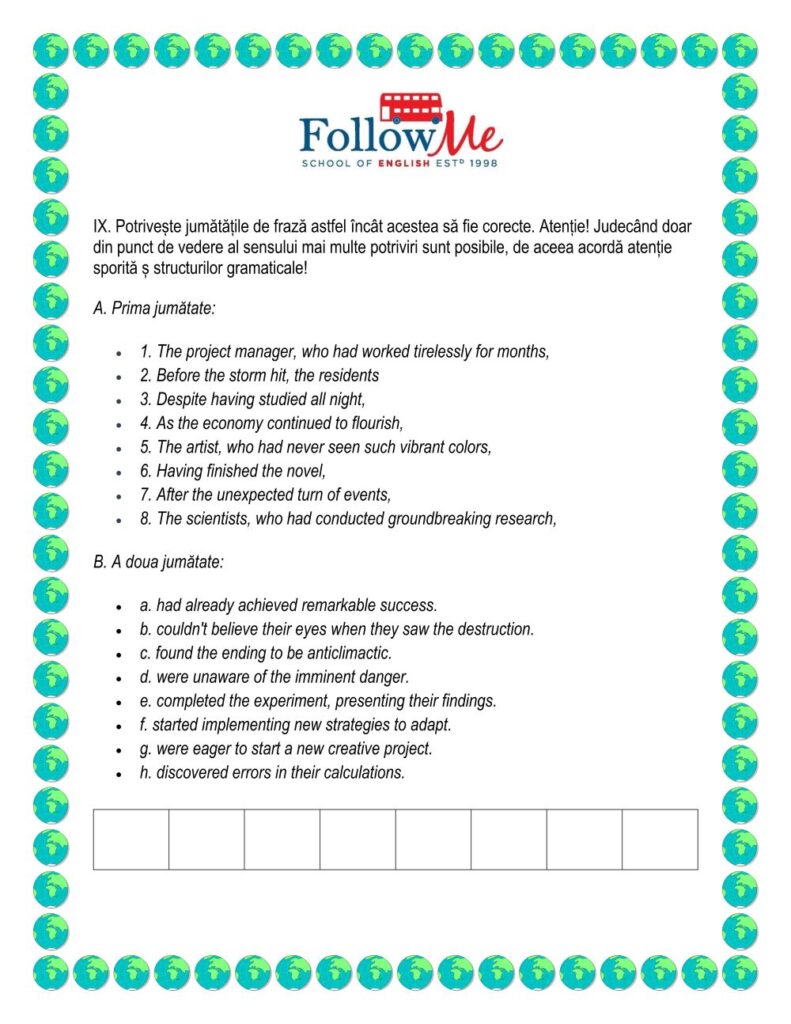
X. Corectează greșelile gramaticale din enunțurile următoare:
- Despite of his efforts, he couldn’t reach the summit.
- Each of the team members are responsible for submitting their reports on time.
- The novel was so interesting that I couldn’t able to put it down.
- Neither of the candidates are suitable for the position.
- She is being working on this project for over a year.
- The meeting has been canceled due to the unexpected circumstances.
- The manager asked to finish the report by tomorrow.
- I’ve met John last week at the conference.
- The more she studied, the less mistakes she made.
- I wish I would have known about the changes in the schedule earlier.
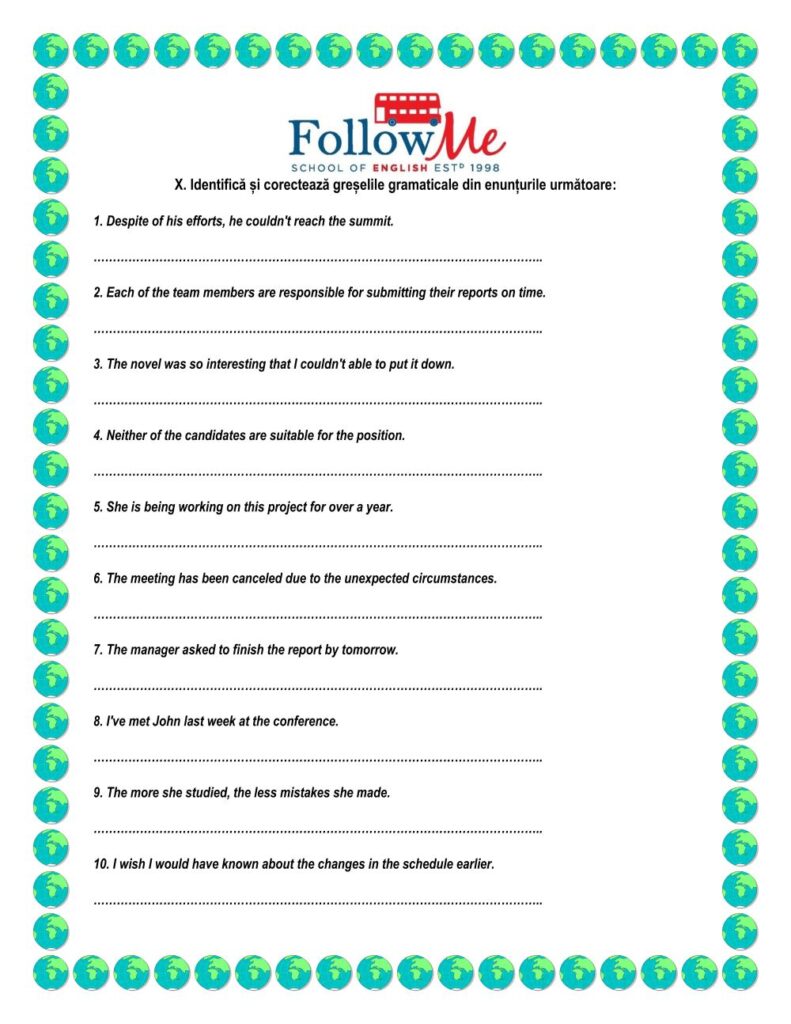
Ce exerciții cu timpurile verbale se dau la examenele Cambridge
Dacă am reușit să te impacientăm până acum cu exercițiile pentru avansați, acum vine vestea cea bună: la examenele Cambridge nu se dau genul acesta de exerciții. Nu se dau, de fapt, exerciții de gramatică deloc ca atare! Nu va trebui să identifici care este Present Perfect Simple sau Continuous, nici să treci la forma negativă sau să explici de ce folosești un anumit timp verbal.
DAR… trebuie să știi bine engleza. Trebuie să o poți folosi conform nivelului atât la probele de Writing (astfel încât, atunci când scrii un eseu, articol, mail, etc să compui textul în mod corect gramatical), cât și la proba Use of English, unde cerințele sunt de așa natură încât testează siguranța ta în folosirea limbii engleze și cât de bine cunoști structura frazei. Poți vizualiza un model de probă Reading and Use of English nivel B2 First aici.
De ce timpurile verbale din engleză sunt dificile pentru români
De fapt, ca să spunem tot adevărul, chiar dacă lucrăm la o școală de engleză pentru copii și adulți, timpurile verbale din engleză NU sunt dificile. Limba engleză este considerată una dintre cele mai ușoare limbi atunci când vine vorba de achiziție ca și limbă străină. Și asta deoarece verbele au cam aceeași formă la toate persoanele, nu există aproape deloc terminații, auxiliarul nu variază prea mult și există o corespondență destul de bună (dar nu identică) între timpurile din engleză și din română. Totuși, ceea ce ne pune probleme este:
- Două tipuri de prezent adevărat: Present Simple, folosit pentru lucruri pe care le facem în mod repetat, de obicei, în fiecare zi și Present Continuous, folosit pentru acțiuni aflate în desfășurare la momentul actual. Destul de greu de digerat pentru nivelul elementar, când se învață prezentul.
- Un timp pe care nu știm să îl decodăm din prima, deoarece nu are corespondent direct în română și anume Present Perfect. Îmi amintesc cum toată școala m-am luptat cu definițiile sale care spuneau că vorbește despre o acșiune care începe din trecut și continuă și în prezent sau are rezultate vizibile în prezent – după capul meu și faptul că m-am născut începuse în trecut și avea legătură cu prezentul, la fel și aproape orice acțiune întreprinsă.
- O corespondență imperfectă între… imperfectul din română și Past Continuous din engleză. Ele se suprapun atunci când spunem:
Mâncam aseară când m-ai sunat / I was eating last night when you called me.
Dar nu și atunci când spunem:
Îmi plăcea să alerg când eram mică. Alergam în fiecare zi.
I liked running when I was little. I ran / used to run / would run every day. (Deoarece, în engleză, aspectul continuu surprinde doar o acțiune aflată în desfășurare.)
- Sistemul românesc clasic de a învăța gramatică (doar) prin intermediul explicațiilor, definițiilor, teoriei, pusă apoi în practică (doar) prin exerciții. În fapt, o modalitate foarte bună de a învăța timpurile verbale în engleză este aceea de a le observa bine prin intermediul expunerii la multe texte, înregistrări și conversații și apoi folosirea lor în exerciții, dar și conversații sau compuneri.
De aceea, curaj și cu studiul înainte! Rezolvarea provocărilor gramaticale și implicit a exercițiilor cu timpuri verbale poate deveni ca un fel de șah, sau dezlegat rebusuri pentru o perioadă. Un antrenament al minții care să te țină în priză și să te ajute să îți îmbunătățești acuratețea în vorbirea și scrierea limbii engleze.
- 10 greșeli pe care le fac românii la examenele Cambridge. Sfaturi pentru a trece cu brio testul - 26 februarie 2025
- „Înțeleg engleza, dar nu pot sa vorbesc”. Cum să vorbești fluent și fără emoții - 20 februarie 2025
- Metode de învățare și tehnici de memorare eficiente și rapide pentru copii și adulți - 18 februarie 2025







